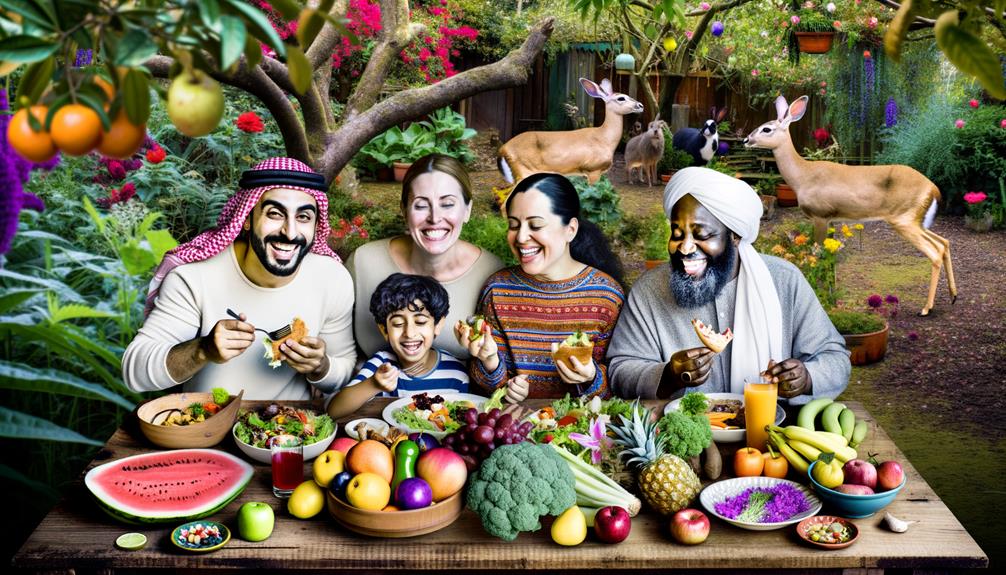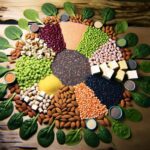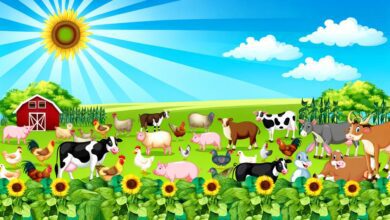As the roots of a grand oak tree spread unseen beneath the ground, so too do the myths and misunderstandings about veganism spread through the cultural soil, often unnoticed yet pervasive. You’ve likely heard the whispers that a plant-based diet can’t provide enough protein or that embracing animal rights means sacrificing the pleasures of the palate. Yet, these notions stem from a patchwork of outdated stereotypes and a lack of nuanced awareness of the ethical, nutritional, and cultural richness of a vegan lifestyle. It’s essential to peel back the layers of these misconceptions with a careful hand, revealing not only the truths that lie beneath but also the implications they carry for our society, our environment, and the sentient beings with whom we share this planet. As we explore these common fallacies, you’ll find that the reality of veganism is far more intricate and rewarding than the myths suggest, beckoning you to look closer at the tapestry of beliefs that shape our choices and our world.
Key Takeaways
- Vegan diets provide sufficient protein and essential nutrients through plant-based sources like beans, lentils, tofu, and quinoa.
- Nutritional yeast is a nutrient powerhouse that adds a cheesy flavor to vegan dishes.
- Veganism reduces animal suffering and environmental harm.
- Proper planning ensures that all nutritional needs can be met without the use of animal products.
Protein and Nutrient Myths
Let’s debunk the myth: you can absolutely get enough protein and essential nutrients from a well-planned vegan diet. Common misconceptions about veganism often revolve around protein. You might’ve heard that it’s difficult to get enough protein from vegan foods alone, but that’s far from the truth. Vegan diets are rich in plant-based protein, with sources like beans, lentils, tofu, and quinoa not only being abundant but also packing a nutritional punch.
Moreover, when you choose to embrace a vegan lifestyle, you’re not just nourishing yourself; you’re also serving the greater good by reducing animal suffering and environmental harm. A varied selection of plant-based sources of protein ensures that you’re not missing out on any essential amino acids. Nutritional yeast, for instance, is a powerhouse of nutrients, including B-vitamins, and it adds a delightful cheesy flavor to your dishes.
Veganism and Food Joy
Embracing veganism unlocks a world of diverse and satisfying culinary adventures that respect cultural traditions while prioritizing animal rights and ethical eating. When you commit to a vegan lifestyle, you’re not just saying no to animal products; you’re opening the door to a treasure trove of flavors that a variety of plant-based foods offer. Eating vegan goes beyond the plate; it’s a journey that invites you to explore and find joy in trying new combinations and creations.
Here’s what you’ll discover:
- Cultural Connection: Veganizing traditional dishes from around the globe allows you to honor and enjoy different cultures without compromising your ethical values.
- Health and Happiness: A vegan diet isn’t just about eliminating animal products; it’s about embracing foods that are rich in nutrients, offering health benefits that can enhance your well-being.
- Creative Culinary Experiences: With more processed vegan options available, you can easily craft a vegan meal that is both quick and delightful, or you can delve into cooking with whole plant-based foods for a more hands-on approach.
You’ll find that plant-based foods can be as indulgent, comforting, and delicious as their animal-based counterparts. So, as someone keen on serving others, introduce them to the pleasures of a compassionate plate.
Cost of a Vegan Lifestyle
While exploring the flavorful world of veganism, you’ll notice that the perceived cost barrier is often less daunting than expected, as plant-based staples tend to be economically friendly and sustainably satisfying. Veganism is a lifestyle that embodies compassion and sustainability, and it’s a common myth that being vegan is expensive. In reality, animal agriculture often drives up the prices of animal-based foods, which can make them costlier than a range of plant-based alternatives.
You might initially think that excluding all forms of animal products would leave a dent in your wallet. However, when you embrace plant-based diets that focus on whole, minimally processed foods like grains, fruits, seeds, nuts, beans, and legumes, you’ll find these items are quite affordable. Moreover, with the rising demand for vegan products, prices for items like fortified plant milks or plant-based milk are likely to decrease over time.
Veganism and Relationships
After discovering that a plant-based diet can be both satisfying and cost-effective, you may find that navigating social dynamics becomes the next hurdle as your relationships evolve with your new vegan lifestyle. One common misconception is that Vegan Damages Relationships, particularly with family and friends who may not understand or support your decision to be vegan.
However, Veganism goes beyond just abstaining from consuming animal products; it’s a commitment to a set of ethical principles that guides your daily choices, including interactions with those you care about. Here are three key points to consider:
- Communication is Vital: Encourage open, respectful conversations to explain your choices without judgment, which can lead to a better understanding.
- Mutual Respect: Recognize that others may never support your lifestyle, but maintaining respect for each other’s choices preserves relationships.
- Inclusive Practices: Find ways to include your loved ones in your vegan journey, such as sharing meals or discussing the benefits you’ve experienced.
Vegan Diet Diversity
Despite common misconceptions, a vegan diet offers a rich tapestry of flavorful and nutritious foods that cater to a wide array of cultural palettes. You’ve likely heard myths about veganism suggesting that those who follow a vegan diet can’t get enough protein or other necessary nutrients. This simply isn’t true. With proper planning, a plant-based diet can meet all your nutritional needs without any animal products.
Enough with the idea that vegans can’t enjoy diverse diets. From leafy greens rich in isoflavones to plant-based sources of calcium, the range of foods available is extensive. You don’t need dairy products to ensure you’re getting enough calcium, and there are plenty of vegan foods high in protein.
Common misconceptions surround the notion that a vegan diet consists merely of salads or that it’s difficult to get enough calories. On the contrary, the variety in veganism is boundless. It encompasses a wide range of grains, legumes, nuts, seeds, fruits, and vegetables. So when you decide to go vegan, remember you’re embracing a world of tastes and nutrients often referred to as limiting, which in reality, is anything but. Veganism positively responds to one’s decision to live ethically, without compromising on taste or health.
Frequently Asked Questions
What Do Vegans Believe About Animal Rights?
You believe animal rights center on ethical treatment, recognizing sentience, and compassion ethics. It’s about liberation philosophy, critiquing speciesism, and moral consistency, advocating for conscious consumption, environmental stewardship, and health with a service-minded approach.
Why Is Veganism a Controversial Topic?
You’re tackling tough topics like vegan ethics and cultural resistance. Veganism’s viewed variably, stirring health debates and social stigma. It’s not just dietary choices; it’s about moral obligation, environmental impact, and challenging nutritional misconceptions.
What Are the Arguments Against Veganism?
You’ve heard veganism’s costly and lacks nutrients, but plant protein myths and expensive lifestyle claims don’t hold up. Compassion drives you to debunk desertification myths and advocate for ethical, sustainable food amidst climate change skepticism.
How Does Veganism Affect Animals?
By adopting a vegan diet, you’re promoting species preservation, reducing your environmental footprint, and fostering ethical agricultural practices, which ultimately leads to better animal impact and protection of biodiversity.







